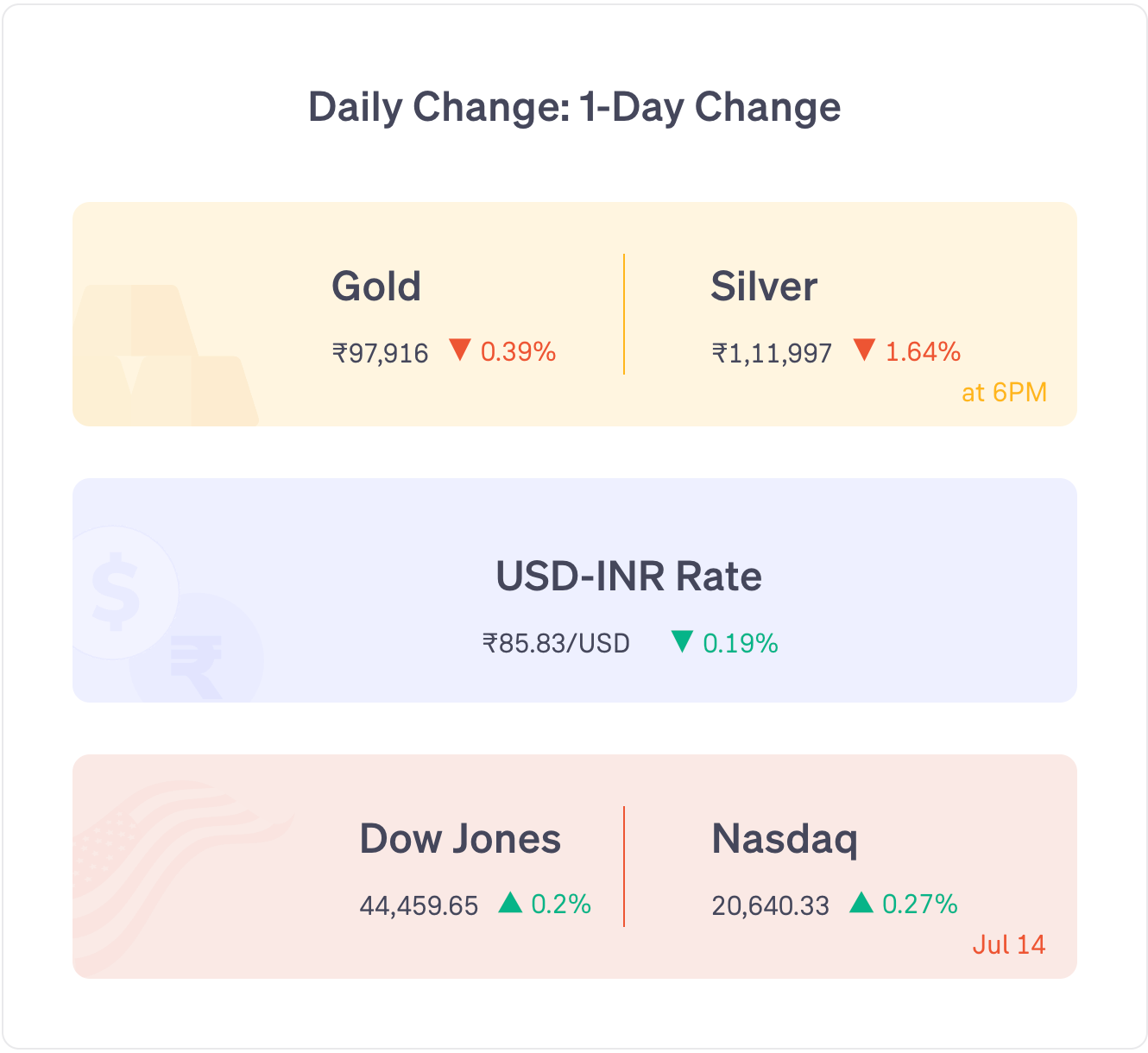Markets opened above yesterday’s closing point.
All sectors’ stocks rose today. Auto stocks and healthcare stocks rose the most.
Global markets: US and European markets closed in green. Most Asian markets rose.
News
India’s trade deficit stood at $18.78 billion in June (vs $21.88 billion in May). Merchandise exports showed a marginal decline of 0.06% year-on-year while merchandise imports fell 3.7%.
The USA's retail inflation rate rose to 2.7% year-on-year in June (vs 2.4% in May). Core inflation (excluding food and energy) rose to 2.9%.
China’s GDP grew 5.2% year-on-year in the April-June quarter (vs 5.4% in Jan-March quarter).
India’s passenger vehicle sales stood at 3.13 lakh units in June, a fall of 7.3% year-on-year.
India’s unemployment rate stayed constant at 5.6% in June. Urban unemployment rate rose to 7.1% in June (vs 6.9% in May).
Anthem Biosciences IPO has been subscribed 3.29 times. Retail subscription: 2.08 times. IPO open till tomorrow (16 July).
Stocks Updates
LIC: the central government appointed Shri R. Doraiswamy as the new CEO & MD for a 3-year term, starting 14 July.
HDFC Life: net profit rose 14.5% year-on-year to Rs 548 crore in the April-June quarter. Net premium income rose 15.9% to Rs 14,539 crore.
ICICI Lombard: net profit rose 28.7% year-on-year to Rs 747 crore in the April-June quarter. Net premium income rose 14% to Rs 5,136 crore.
ICICI Prudential: net profit rose 34.2% year-on-year to Rs 301 crore in the April-June quarter. Net premium income rose 8% to Rs 8,503 crore.
Grasim: fixed 12 August as the record date for the final dividend announced for FY 2024-25.
Info Edge: approved a Rs 25 crore investment in its wholly owned subsidiary SIHL which will be used for investments in tech and AIFs (Alternate Investment Funds).
GAIL: signed a 10-year deal with Vitol Asia to import 1 MMTPA of LNG annually, starting from 2026.
RVNL: received a Rs 447.42 crore order from the Delhi Metro for developing a 7.3 km viaduct and 7 station platforms.
Word of the Day
Record Date
It is the cut-off date set by a company to determine which shareholders are eligible to receive dividends
Investors who buy the shares before that date are eligible for the dividend.
If shares are bought after this date, the investor is not eligible for that specific distribution of dividend.
Example: a company announces a dividend with a record date of 5 August.
If you buy the stock on or before 4 August, your name will appear in the company’s records on 5 August — meaning that you will receive the dividend.
But if you buy the stock on 5 August or later, you won’t be eligible for that dividend.
6 Day Course
Theme: understanding MF returns
Day 2: Tuesday
Mutual fund returns are greatly dependent on the style of investing of the fund manager.
Some managers are value investors, some are growth investors, some are quant, etc.
What’s interesting to note is that different strategies work better in different times.
This means that the mutual funds’ returns will also be higher/lower in those periods based on the style of investing.
Predicting which style will do better in a particular time frame is very hard.
It is just easier to invest for the long term — through good and bad periods.
Example:
Maybe value style gave better returns in 2020-2022, but growth style was better in the 2017-2019 phase.
Say mutual fund ABC uses value style investing. Say XYZ mutual fund uses growth style investing.
In 2017-2019, XYZ had higher returns than ABC.
In 2020-2022, ABC had higher returns.
If you look at their longer term returns (like 7 years or 10 years), they would have performed similarly.
Featured Question
Q. “If a company requires cash - Does it sell shares or issue fresh shares. Which is possible, if both, which is best?”
There are a few ways in which companies can raise cash.
Selling shares is one way. Taking debt is another way.
Apart from these two, it can also re-invest its profits, take advantage of government grants and schemes, etc.
When it sells shares, it can create brand new shares and sell them.
This results in the total number of shares increasing. This also means that each shareholders’ ownership percentage reduces slightly (since total shares are increasing).
When companies increase new shares too much, share prices start to fall.
This is because the company is the same — but the shares are increasing. So the ownership of the company per share is reducing — hence the price reduces.
This is why they cannot keep raising money by creating fresh shares out of nowhere.
Usually when shares are sold without creating new shares, the money goes to shareholders and not the company. This does not benefit the company.
Did you like this edition?
Leave a feedback here!






